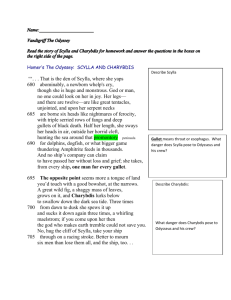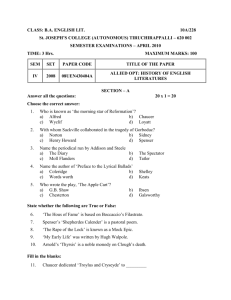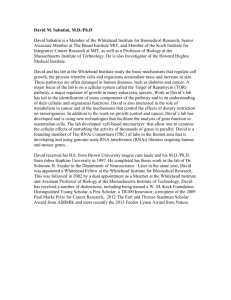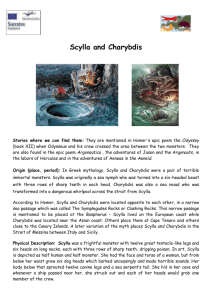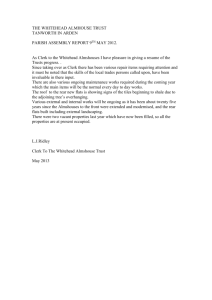5_Whitehead_Chapter 1 - follow in order to start your
advertisement
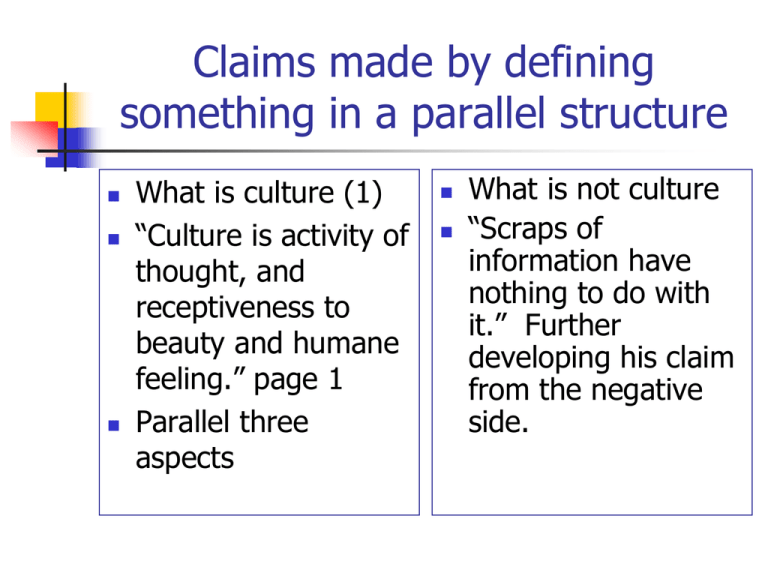
Claims made by defining something in a parallel structure What is culture (1) “Culture is activity of thought, and receptiveness to beauty and humane feeling.” page 1 Parallel three aspects What is not culture “Scraps of information have nothing to do with it.” Further developing his claim from the negative side. Exercise on Parallel Structure to Expand an Definition/Process/Classification, etc. so as to Leave Room for Further Comments. The last but not the least important of the CUSP goals is communication or clear communication which means/covers/involves 1. Willingness to listen; 2. Timely response; 3. Persuasive skills … What is an Inclusive practice? One way to define this is to define what is not an inclusive practice. Make a list of what exclusive practices here and organize the list by certain logic. You can keep going on to comment on the consequences of exclusive practices… William Temple (archbishop) William Temple (15 October 1881 – 26 October 1944) was a priest in the Church of England. He served as Bishop of Manchester (1921–29), Archbishop of York (1929–42), and Archbishop of Canterbury (1942–44). See Whitehead, page 2 “Every intellectual revolution which has ever stirred humanity into greatness has been a passionate protest against inert ideas” (2). Inert ideas that are merely received into the mind without being utilized, or tested, or thrown into fresh combinations. Page 1 Live Ideas will lead to transformative learning The whole book [The Aims of Education] is a protest against dead knowledge, that is to say against inert ideas.” See Whitehead, Preface. That is to say, Live Ideas are those that are utilized, or tested or thrown into fresh combinations. Live Ideas always lead to other, new ideas. Example of inert teaching: force students to memorize some dead data; Live teaching: connect knowledge with cultural, historical, and experiential aspects, etc. The corruption of the best is the worst of all corruptio optimi pessima, Latin The corruption of the best is the worst of all For definition and pronunciation: http://www.merriamwebster.com/dictionary/corruptio%20op timi%20pessima See Whitehead, page 2 To understand all, is to forgive all 2 The result of teaching small parts of a large number of subjects is the passive reception of disconnected ideas, not illumined with any spark of vitality. the French proverb: “To understand all, is to forgive all.” The function of education is to nurture understanding, sympathy, and forgiveness. Reference to St. Augustine Augustine, a Latin church father, is one of the most important figures in the development of Western Christianity. He "established anew the ancient faith" (conditor antiquae rursum fidei), according to his contemporary, Jerome. Best remembered by his book, Confessions (Confessiones, 397-398), among other things. Widely seen as the first Western autobiography ever written, and was an influential model for Christian writers throughout the following 1000 years of the Middle Ages Modern English translations of it are sometimes published under the title The Confessions of St. Augustine in order to distinguish the book from other books with similar titles, such as JeanJacques Rousseau's Confessions. Augustine of Hippo Augustine was born to a pagan father named Patricius and a Catholic mother named Monica. He was educated in North Africa and resisted his mother's pleas to become Christian. Living as a pagan intellectual, he took a concubine, with whom he had a son, Adeodatus, and became a Manichean. Later he converted to Catholic… What is the Rhetorical Reason to Use Allusions or Other References? In 1799, Napoleon staged a coup d'état and installed himself as First Consul; five years later the French Senate proclaimed him Emperor. In the first decade of the nineteenth century, the French Empire under Napoleon engaged in a series of conflicts—the Napoleonic Wars— involving every major European power. After a streak of victories, France secured a dominant position in continental Europe and Napoleon maintained the French sphere of influence through the formation of extensive alliances and the appointment of friends and family members to rule other European countries as French client states. Reason by Analogy The ages of Shakespeare and of Molière are no less past than are the ages of Sophocles and of Virgil. Page 3 A is no less than B… A/B is no less than C/D… William Shakespeare 1564-1616), English poet and playwright (37 plays); England’s national poet (154 sonnets) or the Bard of Avon; and wordsmith (inventing 1700 words); Jean-Baptiste Poquelin, mostly known by his stage name Moli’ère, (January 15, 1622 – February 17, 1673) a French playwright and actor who is considered one of the greatest masters of comedy in Western literature. Among Molière's best-known dramas are Le Misanthrope (The Misanthrope), L'École des femmes (The School for Wives), Tartuffe ou L'Imposteur, (Tartuffe or the Hypocrite), L'Avare ou L'École du mensonge (The Miser), Le Malade imaginaire (The Imaginary Invalid), and Le Bourgeois gentilhomme (The Bourgeois Gentleman). Sophocles, Greek Tragedian (c. 497 BC- 407 BC) Sophocles wrote 123 plays during the course of his life, but only seven have survived in a complete form: Ajax, Antigone, Trachinian Women, Oedipus the King, Electra, Philoctetes and Oedipus at Colonus. Virgil, Roman Epic Poet (70 BCE – 19 BCE) Publius Vergilius Maro (also known by the Anglicised forms of his name as Virgil or Vergil) was a classical Roman poet, best known the Aeneid. Whitehead Furthermore, we should not endeavor to use propositions in isolations. Page 4 En bloc: en bloc (ä blôk , n bl k ) adv. As a unit; all together: "I have been drawing our attention to the public and private qualities of the several arts lest they be treated en bloc" (William H. Gass). Approaching a subject/Topic by consequences The consequences of a plethora of halfdigested theoretical knowledge are deplorable. Page 4 Make a list of consequences and arrange them by the degrees of importance or some other logic. This works most effective when drafting a proposal in which you want to convince your audience to accept your point of view For instance, the relationship between a chair and energy/oil issue Left hand bowling/primrose http://www.youtube.com/watch?v=mTEM_46568U Primrose images: “In education, as elsewhere, the broad primrose path leads to a nasty place” (4). To be "led down the primrose path" is an idiom suggesting that one is being deceived or led astray, often by a hypocrite. The primrose path also refers to someone living a life of luxury apparently linking primroses to libertine indulgence. Whitehead, page 4 Education is the acquisition of the art of the utilization of knowledge. Page 4 Pragmatism or practical dimension in education… If it were easy, the book ought to be burned; In education, as elsewhere, the broad primrose path leads to a nasty place. Keeping Knowledge Alive page 5 It contains within itself the problem of keeping knowledge alive, of preventing it from becoming inert, which is the central problem of all education. Royal road to something 6 “There is no royal road to learning through an airy path of brilliant generalizations” (Whitehead 6). Charles Sanders Peirce, in his How to Make Our Ideas Clear (1878), says, "There is no royal road to logic, and really valuable ideas can only be had at the price of close attention." This essay was claimed by William James as instrumental in the foundation of the philosophical school of pragmatism. Sigmund Freud also famously described dreams as the "royal road to the unconscious". Seven Wise Men of Greece page 6 The Seven Sages (of Greece) or Seven Wise Men (c. 620 BCE–550 BCE) was the title given by ancient Greek tradition to seven early 6th century B.C.E. philosophers, statesmen and law-givers who were renowned in the following centuries for their wisdom. Seven Wise Men of Greece & Their Wise Sayings Solon of Athens - "Nothing in excess" Chilon of Sparta - "Know thyself" Thales of Miletus - "To bring surety brings ruin" Bias of Priene - "Too many workers spoil the work" Cleobulus of Lindos - "Moderation is the chief good" Pittacus of Mitylene - "Know thine opportunity" Periander of Corinth - "Forethought in all things" See the Wood by Means of the Trees The problem of education is to make the pupil see the wood by means of the trees. Page 6 What’s the limit? Life in all its manifestations… First-hand learning vs. second-hand learning Part vs. Whole—Synecdoche Read Aloud and Enjoy Whitehead’s Elegant Prose 7 Elegant intellects which despise the theory of quantity, are but half developed. They are more to be pitied than blamed, The scraps of gibberish, which in their school-days were taught to them in the name of algebra, deserve some contempt. This question of the degeneration of algebra into gibberish, both in word and in fact, affords a pathetic instance of the uselessness of reforming educational schedules without a clear conception of the attributes which you wish to evoke in the living minds of the children. Two Models: Vivid vs. dry The curves of the history are more vivid and more informing than the dry catalogues of names and dates which comprise the greater part of that arid school study. Page 8 Geoffrey Chaucer 8 (c. 1343 – 25 October 1400) Mismatch between this Portrait and his hilarious Stories an English author, poet, philosopher, bureaucrat, courtier and diplomat. Although he wrote many works, he is best remembered for his unfinished frame narrative The Canterbury Tales. Sometimes called the father of English literature, Chaucer is credited by some scholars as the first author to demonstrate the artistic legitimacy of the vernacular English language, rather than French or Latin. In this sense, he is a British Dante as Lu Xun in China. Chaucer, Geoffrey variety in subject matter, genre, tone, and style with complexities and humor Perhaps the chief characteristics of Chaucer's works are their variety in subject matter, genre, tone, and style and in the complexities presented concerning the human pursuit of a sensible existence. Yet his writings also consistently reflect an all-pervasive humour combined with serious and tolerant consideration of important philosophical questions. From his writings Chaucer emerges as poet of love, both earthly and divine, whose presentations range from lustful cuckoldry to spiritual union with God. Thereby, they regularly lead the reader to speculation about man's relation both to his fellows and to his Maker, while simultaneously providing delightfully entertaining views of the frailties and follies, as well as the nobility, of mankind. The Black Death 8-9 1348-1350 The Black Death (8-9) was one of the deadliest pandemics in human history, peaking in Europe between 1348 and 1350. It is widely thought to have been an outbreak of bubonic plague caused by the bacterium Yersinia pestis, but this view has recently been challenged. Usually thought to have started in Central Asia, it had reached the Crimea by 1346. From there, probably carried by fleas residing on the black rats that were regular passengers on merchant ships, it spread throughout the Mediterranean and Europe. between Scylla and Charybdis 14 between two equally perilous alternatives neither of which can be passed without encountering and probably falling victim to the other Classical Mythology. a sea nymph who was transformed into a sea monster: later identified with the rock Scylla Scylla was a horrible sea monster, with six long necks equipped with grisly heads, each of which contained three rows of sharp teeth. Her body consisted of twelve tentacle-like legs and a cat's tail and with four to six dogheads ringing her waist. Odyssey XII In Homer's Odyssey XII, Odysseus is given advice by Circe to sail closer to Scylla, for Charybdis could drown his whole ship: "Hug Scylla's crag—sail on past her—top speed! Better by far to lose six men and keep your ship than lose your entire crew" she warns and tells Odysseus to bid Crataeis prevent her from pouncing more than once. Odysseus then successfully sails his ship past Scylla and Charybdis, but Scylla manages to catch six of his men, devouring them alive: "...they writhed gasping as Scylla swung them up her cliff and there at her cavern's mouth she bolted them down raw— screaming out, flinging their arms toward me, lost in that mortal struggle." Charybdis could drown his whole ship In Greek mythology, Charybdis or Kharybdis (pronounced /kəˈrɪbdɨs/; in Greek, Χάρυβδις) was a sea monster, once a beautiful naiad and the daughter of Poseidon and Gaia. She takes form as a huge bladder of a creature whose face was all mouth and whose arms and legs were flippers and who swallows huge amounts of water three times a day before belching them back out again, creating whirlpools. The Nature of Education "Education is the acquisition of the art of the utilization of knowledge." This simple sentence from Whitehead's introductory essay in his Aims of Education (1929, p. 4), epitomizes one of his central themes: Education cannot be dissected from practice. write a paragraph long précis A précis (English pronunciation: /preːˈsiː/) is a formal summary of a given subject. A précis does not seek to persuade in regard to a subject, but simply to present it, be that subject an artifact, a person, an event, or even a concept. It should provide the reader an accurate, brief, and well-rounded impression of the subject. Any opinion the writer may hold on a subject should not be reflected in the writing of a précis. A verbal summary composed in this fashion may also be called a précis. The word is French in origin, and retains in English most of its original French pronunciation. One who produces a précis on a subject is said to precise (English pronunciation: /prɪˈsaɪ̯ z/) that subject.
